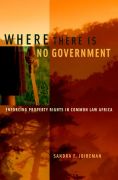
Where there is no government: enforcing property rights in common law africa
Joireman, Sandra
Where There is No Government is at once an authoritative and powerful account of this central dilemma in Africa, and a prescription for addressing it. In Sub-Saharan Africa, property rights law is an especially potent source of instability. As the worldwide post-Cold War era trend toward state-run property rights expansion clashes with longstanding customs and what many would consider bureaucratic incapacity, conflicts are inevitable. Many advocates from NGOs have argued that the region's manifold governance problems stem at least in partfrom the state's inability to enforce property rights. Instead, 'private' property rightsregimes, largely independent of the state, have flourished.In recent years, there has, in fact, been a concerted effort to create stronger property rights laws, and in Where There is No Government, Sandra Joireman traces how this has played out in Ghana, Uganda, and Kenya. The problem is that while new, better laws might now be on the books, they effectively do not exist if they are not enforced--a fact that causes major problems for development. Those who possess land cannot legally prove it's theirs, and those who are often culturallyprohibited from owning property, like women and migrants, have trouble exercising their legal rights to property.While there are those who may argue that African understandings of property law are relatively efficient and adaptable because they have evolved organically, Joireman contends that this view discounts one very likely possibility--that such systems are in fact predatory and favor elites. Operating from this assumption, she employs a series of novel measures to determine which types of property regimes promote social welfare and which hinder it. She concludes that while the sub-Saharan statesusually have a monopoly over the use of force, they typically do not have control over property law. Bowing to customary understandings of property, they have largely ceded it to private actors (many of whom are criminal). If Africa is to develop in a manner that promotes broad social well being, alegalistic approach is inadequate--changes in statutes and laws are not enough. State institutions must be able and willing to enforce property rights if development is to occur. Where There is No Government is at once an authoritative and powerful account of this central dilemma in Africa, and a prescription for addressing it. INDICE: 1. Introduction 2. Colonization and the Myth of the Customary 3. "Under the Circumstances, We Do What We Can": Entrepreneurial Bureaucrats and the Allocation of Property Rights 4. Property Rights Enforcement by Other Means: The Role of Non-Governmental Organizations 5. Private Enforcement of Property Rights: The Demand for Specialists in Violence 6. In Search of Order: State Systems of Property Rights Enforcement and their Failings 7. Drawing Conclusions 8. Bibliography 9. Appendix
- ISBN: 978-0-19-978248-2
- Editorial: Oxford University
- Encuadernacion: Cartoné
- Páginas: 224
- Fecha Publicación: 11/08/2011
- Nº Volúmenes: 1
- Idioma: Inglés
